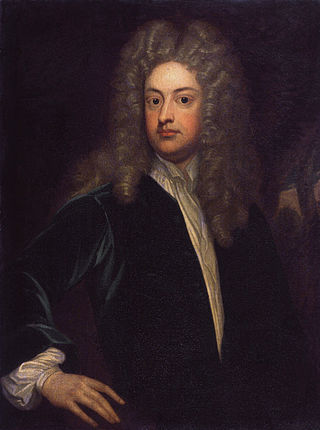Related Research Articles

General John Churchill, 1st Duke of Marlborough, 1st Prince of Mindelheim, 1st Count of Nellenburg, Prince of the Holy Roman Empire, was an English soldier and statesman whose career spanned the reigns of five monarchs. From a gentry family, he served first as a page at the court of the House of Stuart under James, Duke of York, through the 1670s and early 1680s, earning military and political advancement through his courage and diplomatic skill.

Joseph Addison was an English essayist, poet, playwright, and politician. He was the eldest son of Lancelot Addison. His name is usually remembered alongside that of his long-standing friend Richard Steele, with whom he founded The Spectator magazine. His simple prose style marked the end of the mannerisms and conventional classical images of the 17th century.
This article contains information about the literary events and publications of 1712.
Events from the year 1714 in literature.
This article contains information about the literary events and publications of 1719.
This article contains information about the literary events and publications of 1704.

Nicholas Rowe, English dramatist, poet and miscellaneous writer, was appointed Poet Laureate in 1715. His plays and poems were well-received during his lifetime, with one of his translations described as one of the greatest productions in English poetry. He was also considered the first editor of the works of William Shakespeare.

Susanna Centlivre, born Susanna Freeman, and also known professionally as Susanna Carroll, was an English poet, actress, and "the most successful female playwright of the eighteenth century". Centlivre's "pieces continued to be acted after the theatre managers had forgotten most of her contemporaries." During a long career at the Theatre Royal, Drury Lane, she became known as the second woman of the English stage, after Aphra Behn.
Events from the year 1743 in Great Britain.
Nationality words link to articles with information on the nation's poetry or literature.
Nationality words link to articles with information on the nation's poetry or literature.
Events from the year 1674 in England.
Events from the year 1715 in Great Britain.

The Tragedy of Lady Jane Grey, often shortened to Lady Jane Grey, is a 1715 tragedy by the British writer Nicholas Rowe. It portrays the brief reign of Lady Jane Grey, a pretender to the English throne following the death of Edward VI and her defeat and execution by Mary I in 1554. The title role was played by the prominent actress Anne Oldfield. The cast also included John Mills as the Duke of Northumberland, Barton Booth as Lord Guilford Dudley and Lacy Ryan as the Earl of Sussex, Colley Cibber as Bishop Gardiner, James Quin as the Lieutenant of the Tower and Mary Porter as the Duchess of Suffolk.

The Royal Convert is a 1707 tragedy by the British writer Nicholas Rowe. The play is set in England during the Saxon era featuring two brothers in a love triangle with a young Christian woman.
Tamerlane is a 1701 history play by the English writer Nicholas Rowe. A tragedy, it portrays the life of the Timur, the fourteenth century conqueror and founder of the Timurid Empire. Rowe, a staunch Whig, used the historical story as an allegory for the life of William III who resembles his portrayal of Tamerlane while his opponent the Ottoman leader Bayezid I was equivalent to William's longstanding opponent Louis XIV of France. An earlier version of the story Tamburlaine was written by Christopher Marlowe during the Elizabethan era with a very different focus in the context of the English Renaissance.

The Tragedy of Jane Shore is a 1714 historical tragedy by the British writer Nicholas Rowe. It was his penultimate play, and was inspired by the life of Jane Shore the mistress of Edward IV.

Arthur Lewis Jenkins was a British soldier, pilot and war poet.

The Battles of Talavera is an 1809 poem by the Irish writer John Wilson Croker. It was written in commemoration of the Battle of Talavera, where Sir Arthur Wellesley led an Allied force of British, Portuguese and Spanish troops to a victory over the French in the Peninsular War. The victory led to popular celebrations in Britain and Wellesley was made Lord Wellington.
